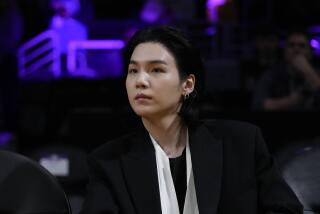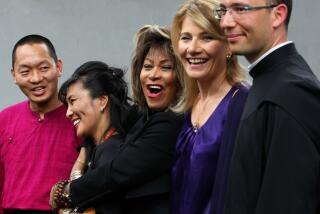Military Opens Chaplain Ranks to Buddhists
- Share via
The Defense Department has decided to permit Buddhist chaplains to serve in the U.S. armed forces--marking the first time a religious group outside of Christianity or Judaism will be represented in the military chaplaincy, it was announced Monday.
The step, long sought by the Buddhist Churches of America, is “a tremendous breakthrough,” said Bishop Seigen H. Yamaoka of the San Francisco headquarters of the predominantly Japanese-American association.
In a letter to Yamaoka, Air Force Col. John L. Mann, executive director of the Armed Forces Chaplains Board, said, “This is a historic precedent. It is the first time a group outside the Judeo-Christian tradition has been recognized.” The letter, dated Oct. 13, granted the Buddhist Churches of America’s request to certify clergy for military chaplaincies.
According to a 1984 religious survey by the Department of Defense, at least 2,493 Buddhists of various sects and ethnic backgrounds were in military service.
One of the astronauts who died in the 1986 explosion of the space shuttle Challenger was Air Force Col. Ellison S. Onizuka, a member of the same Jodo Shinshu tradition represented in the Buddhist Churches of America. The Buddhist funeral services after his death made more people aware of Americans of Buddhist persuasion, Yamaoka said.
The Buddhist Churches of America, now 88 years old, has 150,000 adherents, 66 clergy and 63 temples in the United States. The total number of U.S. Buddhists is unknown. But the chaplains certified by the Buddhist Churches of America, like chaplains of any religious denomination, would serve Buddhists of other traditions as well as military personnel of any faith.
James Nagahiro, administrative officer of the Buddhist Churches of America, said, “I spent 30 years in the Air Force and I became good friends with Protestant and Catholic chaplains,” he said.
In 1985, the Buddhist group apparently met Defense Department requirements for religious denominations to be approved as certifying agencies for military chaplains. Its Institute of Buddhist Studies, which provides seminary training for its clergy, became affiliated in that year with the Graduate Theological Union, a Berkeley consortium of mostly Christian seminaries.
Yamaoka acknowledged that most Buddhist sects in this country do not have the formal organization that his denomination does. In its early missions to Japanese-American Buddhists around the turn of the century, the denomination adopted much of the terminology of Christian groups and still calls its clergy “ministers.”
During World War II, many Japanese-American members of the military were designated “Protestant” or “no religious preference” on personnel forms because Buddhism was not officially recognized, the bishop said. Buddhists have been members of some highly decorated military units, including the Army’s 442nd Regimental Combat Team in World War II.
More to Read
Sign up for Essential California
The most important California stories and recommendations in your inbox every morning.
You may occasionally receive promotional content from the Los Angeles Times.













